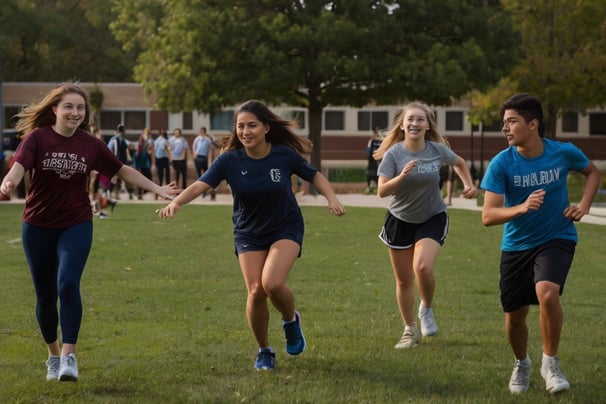How do extracurricular activities influence student stress management?
How do extracurricular activities influence student stress management? You might be surprised to learn that the answer goes beyond just relieving stress. Discover how the hidden benefits of ECAs—like emotional resilience, problem-solving skills, and unexpected academic advantages—can reshape how students tackle pressure.
11/20/20248 min read
The question, How do extracurricular activities influence student stress management? has become increasingly relevant in an age where academic pressures, social challenges, and personal uncertainties can weigh heavily on students. In the quest for academic success, many students find themselves overwhelmed by the constant demands of schoolwork, leaving little time for self-care and relaxation. However, extracurricular activities (ECAs)- activities that occur outside of the traditional classroom—serve as essential tools in helping students manage stress, develop resilience, and thrive both academically and personally.
Research has shown that ECAs can play a crucial role in building resilience and reducing stress for students. ECAs can act as stress buffers, improving students' emotional well-being and mitigating academic burnout. This finding aligns with the idea that extracurricular activities help students develop healthy coping mechanisms for stress. By participating in activities outside of the classroom, students can redirect their stress into productive and enjoyable pursuits, allowing them to build emotional resilience in the process.
Additionally, physical activities such as sports, have a direct impact on reducing student stress by promoting mental and physical health. ECAs like these not only boost physical fitness but also trigger the release of endorphins, which are natural stress relievers, helping students maintain a positive outlook during stressful times. This supports the idea that students involved in regular physical activity are better equipped to handle stress in high-pressure academic environments, which is particularly important for students trying to avoid burnout in competitive academic programs.
Social activities also play an important role. ECAs that involve teamwork and collaboration help foster a sense of belonging, which can buffer against social pressures and academic stress. These activities allow students to balance study and social life, creating a more well-rounded experience that reduces feelings of isolation and enhances emotional support systems. This balance is vital for students in competitive academic programs who are at risk of burnout, as it offers them an opportunity to step back, recharge, and refocus.
In this blog, we will explore how ECAs influence stress management, with a particular focus on the physical, psychological, and social benefits they offer


How Do Extracurricular Activities Influence Student Stress Management? An Overview
We know that ECAs play a significant role in how we manage stress, offering opportunities for physical, emotional, and social engagement that promote overall well-being. Whether participating in athletic events, artistic performances, or social organizations, ECAs provide us with structured breaks from the academic pressures we face. These activities help us unwind, recharge, and develop resilience—skills that directly counteract the stress of academic life.
Studies confirm that students who engage in ECAs report a reduction in burnout and improved emotional health. For instance, we have observed that taking breaks from academic work and engaging in meaningful, non-academic activities provides us with a much-needed emotional release.
Whether through playing a team sport, creating art, or performing music, these activities allow us to focus on something fulfilling and rewarding, providing a break from the demands of schoolwork. In turn, we return to our academic tasks feeling more refreshed and focused, reducing the likelihood of burnout.
Physical activities, in particular, have immense benefits for stress management. We have firsthand experience of the positive effects that sports and exercise have on our stress levels. Regular physical activity releases endorphins, which elevate our mood and reduce anxiety, making it easier for us to stay calm in stressful situations.
Besides the physical benefits, ECAs also provide a critical social outlet. Many of us have felt the relief of connecting with peers through clubs, teams, or community activities. These interactions help reduce feelings of loneliness, especially during stressful times, and they foster a sense of belonging and emotional support. By participating in team-based or collaborative activities, we learn how to manage social pressures, which in turn strengthens our resilience. These social connections help us feel supported, valued, and understood, making it easier to manage the stressors we face both inside and outside the classroom.
In summary, extracurricular activities are a powerful tool in student stress management. Whether we’re seeking a creative outlet, staying active, or simply making new friends, ECAs are integral in helping us maintain emotional well-being and academic success.


Fostering a Balanced Routine
We’ve all experienced the stress of balancing academic obligations with personal responsibilities. But one of the major benefits of extracurricular activities is that they help us establish a more balanced routine.
Students who regularly participate in ECAs report higher levels of satisfaction with their time management, as these activities provide us with structured opportunities to balance both work and play. By making time for personal pursuits outside of academic commitments, we maintain a healthier, more organized approach to our daily lives.
Having a balanced routine allows us to avoid the pitfalls of burnout. We’ve come to understand that taking breaks to engage in activities that we enjoy helps us recharge mentally and physically, reducing the risk of exhaustion.
For example, when we engage in creative activities like drama or music, we are able to express our emotions in a positive way, which helps relieve emotional tension. As we shift our focus from schoolwork to something enjoyable, we return to our studies with a renewed sense of energy, allowing us to work more effectively and manage stress better.
Providing an Outlet for Creative Expression
Creativity can be one of the best ways to cope with stress, and ECAs that involve creative expression offer us a safe space to process complex emotions. Whether through music, theater, or writing, these activities allow us to channel our stress and frustrations in a productive way.
We’ve noticed that participating in these creative outlets has not only helped us manage stress but also improved our overall emotional well-being. As we engage in artistic activities, we are given the freedom to express our feelings, which in turn helps us deal with anxiety, depression, or other emotional challenges.
Studies confirm that creative activities such as music and art have therapeutic benefits. By engaging in these forms of self-expression, we can navigate the emotional challenges of academic life and personal struggles more effectively.
Whether it’s through painting, playing an instrument, or performing on stage, these outlets help us release pent-up emotions, allowing us to return to our academic work feeling calmer and more focused.


Reducing Stress Through Physical Activity
Physical activity is one of the most effective ways to combat stress, and extracurricular physical activities (EPAs) are especially beneficial in this regard. Many of us take part in team sports, fitness clubs, or recreational activities like hiking and swimming.
These activities not only improve our physical health but also provide mental relief, helping us manage stress more effectively.
Improved Physical Health and Stress Relief
Engaging in physical activity boosts our overall physical health, which is a cornerstone for effective stress management. Whether it’s through yoga, swimming, or team sports, regular exercise helps us stay fit, which in turn supports our emotional health.
As we’ve experienced, the release of endorphins from physical activities makes us feel more relaxed and positive, even when the pressures of school are mounting. Additionally, we’ve noticed that regular exercise improves our sleep quality, helping us feel more rested and less anxious.
Boosting Cognitive and Emotional Resilience
EPAs not only benefit our physical health but also improve our cognitive and emotional resilience. Studies show that physical activities enhance memory, focus, and attention—all of which are essential for academic success.
Engaging in sports or other physical activities helps us build greater mental endurance, making it easier for us to manage academic and personal challenges without feeling overwhelmed.
The teamwork aspect of many physical activities also strengthens our emotional resilience, as we learn to work together to overcome obstacles. Through these experiences, we gain a sense of accomplishment and confidence that empowers us to handle stress more effectively.


Building Emotional Resilience Through ECAs
We all know how overwhelming student life can get—juggling assignments, exams, and trying to maintain a social life. Through our own experiences, we’ve learned that extracurricular activities (ECAs) can be a powerful way to build emotional resilience and manage stress.
They provide us with a supportive space to cope with challenges, grow personally, and face setbacks head-on. Involvement in activities like drama, debate, or volunteering allows us to explore our identity and values in a safe and supportive environment, which we’ve found to be vital for emotional growth.
This process of self-discovery nurtures our emotional intelligence, a key skill that helps us manage stress more effectively and maintain greater emotional stability in our daily lives.
Exploring Personal Growth
We’ve experienced firsthand how engaging in activities such as drama, debate, or volunteer work allows us to explore who we really are.
These activities provide a platform for self-discovery, and we can attest to the fact that they help us better understand our emotions, reactions, and personal triggers. In times of stress, knowing ourselves—our strengths and weaknesses—allows us to cope more effectively.
This kind of emotional growth makes it easier to navigate academic and personal stress, because we’re not just managing what’s happening externally, but we’re also learning how to manage ourselves in those moments.
Strengthening Problem-Solving Skills
What we've come to realize is that ECAs, especially those involving teamwork like sports or group projects, help us build essential problem-solving skills. There’s something unique about working with others to overcome challenges—whether it's strategizing for a game or collaborating on a community service project.
These experiences have strengthened our communication skills, improved how we handle conflicts, and sharpened our ability to work toward common goals. Through these activities, we’ve learned how to tackle stressful situations with confidence, which has helped reduce the anxiety we might otherwise feel when facing group assignments, exams, or deadlines.
With this newfound sense of control, we feel less helpless in high-pressure situations.




Fostering Social Connections and Community Support
One of the most important aspects of ECAs, in our experience, is how they create opportunities for social connection. These activities are a lifeline when it comes to managing stress, offering us chances to build lasting friendships and connect with a supportive community.
The sense of belonging we get from participating in group sports, social clubs, or volunteer work has been invaluable. It's comforting to know that when things get tough, we have a community to turn to.
Sense of belonging is essential for mental well-being, as it reduces feelings of isolation and loneliness—two major contributors to stress. When we share common interests with others, we develop a support system that becomes even more important during times of uncertainty.
Mentorship and Peer Support
We’ve also seen how valuable mentorship is through extracurricular activities. Whether from experienced peers or adult mentors, these relationships have provided us with guidance, encouragement, and advice.
In moments of academic or personal stress, having someone who can offer a fresh perspective or just lend an ear makes a world of difference.
Mentorship is crucial in helping students manage stress, and we’ve felt this firsthand. These supportive environments, where we can share our concerns and receive feedback, help us build the resilience we need to face academic pressures head-on.




Addressing Mental Health Challenges Through ECAs
Mental health challenges, such as anxiety and depression, are something many of us face during our academic journey. Fortunately, ECAs provide an important tool in managing these challenges.
By offering a way to express ourselves and connect with others, ECAs help alleviate symptoms of anxiety and depression, as we’ve experienced ourselves.
Students who participate in ECAs experience reduced levels of anxiety and depression, and we’ve noticed how this has been true for us. These activities provide much-needed outlets for stress, allowing us to process our emotions in healthier ways.
Mitigating Anxiety and Depression
We’ve found that the act of being involved in something outside of our academic work provides us with an essential emotional outlet. Whether it’s through sports, music, or creative activities, these outlets allow us to release built-up stress and tension.
These activities are important in mitigating mental health struggles, and we’ve seen this firsthand. The social connection, physical activity, and emotional release we experience through ECAs all contribute to reducing anxiety and depression, helping us better cope with the pressures of student life.
In the end, extracurricular activities have been a lifeline in helping us manage stress. Through physical exercise, emotional expression, social engagement, and cognitive development, ECAs provide us with the tools we need to face the challenges of student life with resilience.
As we've seen through our own experiences and backed by studies, these activities not only reduce stress but also foster emotional growth, boost academic performance, and improve mental health. So, if you’re feeling overwhelmed, consider getting involved in an extracurricular activity—it might just be the break you need.
At the end of this article we would like to suggest some literature which has helped in to achieve a more profound understanding of the relation between ECAs and the successful srtress management. We encourage you to explore these studies:
Mukesh, H., Venkatesh, A., Acharya, V., & Pillai, R. (2023). Are extracurricular activities stress busters to enhance students' well-being and academic performance? Journal of Applied Research in Higher Education, 15(1), 152–168.
Zarazaga-Peláez, J., Barrachina, V., Gutiérrez-Logroño, A., Villanueva-Guerrero, O., Roso-Moliner, A., & Mainer-Pardos, E. (2024). Impact of Extracurricular Physical Activity on Achievement of the Sustainable Development Goals and Academic Performance: Mediating Cognitive, Psychological, and Social Factors. Sustainability, 16(16), 7238.
Villemaire-Krajden, R., & Barker, E. (2024). Curbing the Campus Mental Health Crisis: The Role of Extracurricular Activity Participation. Journal of Youth Development, 19(2), Article 2.


